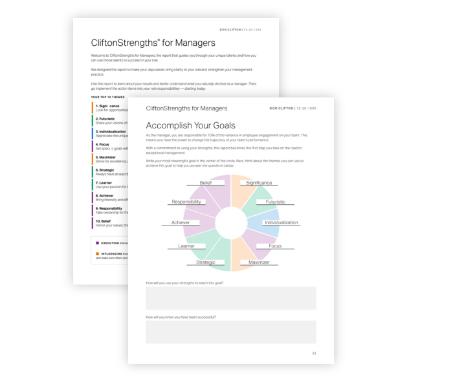Story Highlights
- Conversations with their manager define the employee experience
- There's no "one-size-fits-all" approach to management
- Strengths tell you how you manage best
The employee experience begins and ends with the manager.
To be more exact, an employee's conversations with their manager define their employee experience. A damaging conversation with their manager can be the flame that sets fire to that person's entire employee experience.
But the opposite is just as true. Effective and personal conversations engage employees, keep them excited about their job, and improve their performance and wellbeing.
Gone are the days when managers clock in, delegate tasks and clock out. Now, every manager must be intentional and authentic when speaking with their employees.
Just as importantly, leaders need as many managers as possible who know how to provide a great employee experience.
Managers don't need a one-size-fits-all approach. They need a personal shortcut.
There's more than one way for people to excel at something.
In fact, people should be wary of the advice that the best way to do a job is the same way everyone else does it. This simply isn't true.
Great managers aren't great managers because they all manage the same way. They are great because they manage their way.
The first step to developing better managers is knowing just how important it is for them to succeed. Managers -- more than any other factor -- influence team engagement and performance. That's not an exaggeration: 70% of the variance in team engagement is determined solely by the manager.
When managers show up to work with a deep understanding of how they'll use their strengths, they will have better conversations, greater performance results and higher engagement from their team.
Managers -- more than any other factor -- influence team engagement and performance. That's not an exaggeration: 70% of the variance in team engagement is determined solely by the manager.
Gallup is in a unique position to help managers excel in this area: finding their best way to manage. With over 25 million completed CliftonStrengths assessments, we understand exactly what can happen when individuals live their lives using their strengths.
And whether organizations want to improve the culture, increase employee engagement, strengthen wellbeing or improve relationships with customers, it all hinges on the quality of the managers.
After studying more than one million managers across 100,000 organizations, Gallup has found that when managers and their employees actually apply their strengths to their work and lives every day, they are:
-
six times as likely to be engaged in their jobs
-
three times as likely to report having an excellent quality of life
-
six times as likely to strongly agree that they have the opportunity to do what they do best every day
Think about the real-life application of those numbers. What would happen if every manager knew what they did best, knew how to communicate it to their team and how to use their strengths to have stronger conversations? That alone would change the world.
There's no "ideal set of strengths" that make a perfect manager.
Managers either make an organization succeed, or they make it fall behind. And they either inspire their employees to higher performance or turn them into enemies of the organization.
In other words, poor management produces poor outcomes, and excellent management produces excellent outcomes.
But if you're looking for a be-all and end-all to excellent management, you should know that an "ideal set of strengths" for great managers doesn't exist. We've seen successful managers lead with Command and Strategic, while others crush goals with Empathy and Positivity.
Great managers aren't great managers because they all manage the same way. They are great because they manage their way.
A manager's strengths don't determine if they're a good manager -- they tell them how they can manage best. Between feeling pressure to meet performance goals, lacking time and resources, and balancing their own tasks with their employees' tasks, managers need something that works fast. Something that they already have but haven't yet discovered: their strengths.
For a more engaged organization, start with the manager.
Managers have conversations all day, every day. But are they talking to their people in a meaningful way or just going through the motions?
Imagine if your managers knew what they do best and felt more confident and engaged in their own role. Consider how that would positively affect your employees, the health of your teams and your organization's engagement overall.
The best way to increase team performance, engagement and wellbeing is to start with a manager's strengths. It isn't just a good idea to help your managers use their strengths to make their days easier -- it's the right idea. To make the world a better place, we have to start with the workplace. And to make the workplace better? You guessed it -- we start with the manager.
Develop better managers to create stronger teams:
- Learn how the CliftonStrengths for Managers report can change how managers lead, work and win, and buy your copy of the report here.
- Watch this video to learn more about how the CliftonStrengths for Managers report can help organizations succeed.





